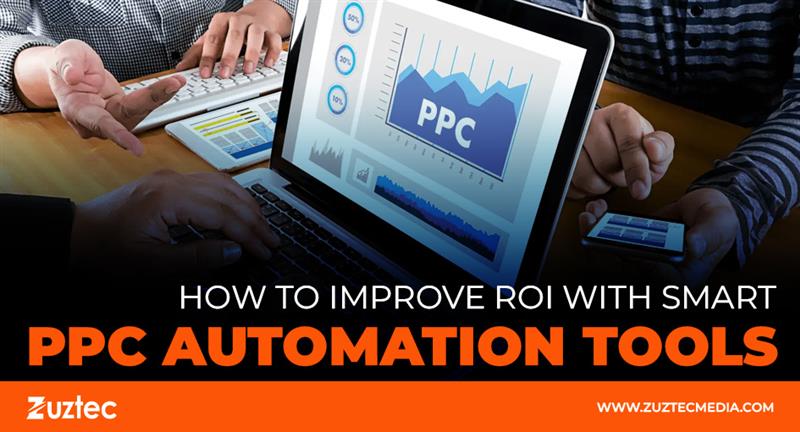
How To Improve ROI With Smart PPC Automation Tools
Pay-per-click (PPC) advertising remains one of the most effective ways to drive traffic, leads, and sales. That’s where automation tools come in. With the right PPC automation tools, advertisers can streamline workflows, reduce wasted ad spend, and improve overall campaign performance.
Whether you’re managing campaigns on Google Ads, Microsoft Ads, or social platforms like Facebook, the use of automation tools has become standard practice. These tools can help with bidding strategies, budget adjustments, A/B testing, ad scheduling, and performance reporting.
For marketers juggling multiple campaigns or working within tight budgets, PPC automation offer a more efficient way to achieve goals. Rather than spending hours reviewing data and making manual changes, you can rely on intelligent software to make data-driven decisions in real time. This enables businesses to respond faster to market shifts and competitor actions while maintaining better control over results.
Choosing the right automation tools depends on your goals, experience level, and the complexity of your campaigns. From simple rule-based automations to AI-powered platforms that handle everything, there’s a tool for every advertiser. Understanding the features and benefits of these platforms is essential for making the right decision.
PPC Automation Tools Optimize Campaign Efficiency
Using automation tools is a practical way to eliminate repetitive tasks while improving performance. These tools are designed to optimize various aspects of your campaign—from setting bids to pausing underperforming ads—so you can focus on strategy instead of manual upkeep.
Rule-based automation is one of the most common types. With this setup, you can create specific triggers and conditions for actions, such as increasing bids when conversions exceed a set threshold or pausing ads with low click-through rates. This ensures that your campaigns are constantly being fine-tuned based on real-time performance data.
More advanced tools use machine learning to make predictions and adjust campaigns automatically. These platforms analyze large volumes of data, learn patterns over time, and make decisions aimed at increasing ROI. This form of smart automation reduces the risk of human bias and speeds up optimization.
Features That Make Automation Tools Valuable
When evaluating PPC automation tools, it’s important to understand what features align best with your needs. One of the most valuable features is automated bidding, which adjusts your bids in real time based on performance goals. This feature ensures that your ads stay competitive without constant oversight.
Another important feature is budget pacing. These tools help distribute your ad spend more evenly throughout the day or week, preventing early budget exhaustion and improving consistency in results. Performance alerts and custom rules allow marketers to stay informed and make proactive adjustments without having to monitor accounts constantly.
In the middle of your campaigns, automation can take over repetitive tasks such as pausing low-performing keywords, rotating ad copy, and managing ad schedules. With automated reporting, you can receive daily or weekly updates without manually pulling data from different platforms.
Some tools also include integrations with CRMs and analytics software, giving you a full view of the customer journey. This data helps you refine targeting and message delivery, leading to better campaign outcomes. Always look for tools that support the platforms you use and provide a user-friendly interface for setting up and managing automations.
Choosing the Right Tool for Your Business
For small businesses, simple platforms that offer basic rule-based automations may be enough to drive efficiency. These are often more affordable and easier to manage without requiring deep technical expertise.
Mid-sized businesses may benefit from tools that offer a balance of manual control and smart automation. Look for features like smart bidding, conversion tracking, and A/B testing. These can help you scale campaigns while maintaining oversight.
Larger companies or agencies with multiple clients typically need enterprise-level platforms. These tools offer multi-account management, bulk editing capabilities, advanced analytics, and AI-powered automation. While more expensive, they are ideal for managing high-volume campaigns across multiple platforms.
When comparing options, consider factors like customer support, ease of use, learning curve, and pricing structure. Many tools offer free trials or demos—take advantage of these before committing to a long-term contract.
However, PPC automation tools have transformed the way marketers manage paid campaigns. From improving ad performance to reducing time spent on manual tasks, these tools are essential for staying competitive in today’s fast-moving digital landscape. With the help of automation, you can make smarter decisions, optimize your ad spend, and achieve better results without constant oversight.
The effectiveness of PPC automation depends on how well they are aligned with your goals and campaign structure. By choosing the right features and platforms, you can streamline your workflows and enhance your return on investment.
Whether you’re a solo marketer or part of a large team, the right automation solution can free up time and improve campaign outcomes. In a digital world where every click counts, investing in the right tools can set your business apart and ensure long-term success.

